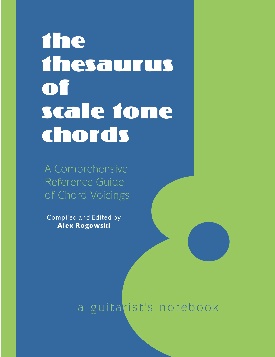
Alex Rogowski is a creative mind that I have admired for many years now via his blogs and now website called A Guitarist’s Notebook. In addition to numerous transcriptions, lessons, harmonic and melodic explorations – his work is not for the timid. Alex goes deep into advanced harmonic territory for the serious jazz and/or music nerd.
This is his first book (181 pages, spiral bound) that was released in 2009. Since then, he has also written another book called Scales (which I also like and own a copy of) but is officially unreleased yet.
To begin, let’s check out Alex’s own description of the book’s contents:
The Thesaurus of Scale Tone Chords presents the gamut of fundamental chord forms from the quintessential harmonic scales. Specifically, making no distinction for notes of the same name in different octaves, every permutation of triads and tetrads which can be derived from the Major, Harmonic Minor, Melodic Minor, Harmonic Major, Double Harmonic Major, and the Augmented, Dominant Diminished and Whole Tone scales has been included.
Additionally, a unique system of identifying various chord types is employed allowing for easy cross referencing.
The book is divided into four sections:
- Preface (Introduction and General Guide)
- The Heptatonic Scale Tone Chords
- The Symmetric Scale Tone Chords
- Reference
This book is essentially what it calls itself, it’s a thesaurus – therefore it provides organised raw musical materials for the creative musician to explore and use. As I experienced the book, I found that reading through the examples opened up different sounds and interval combinations for my comping and improvisation. I found favourites over time and certain chord voicings that I didn’t usually use. The book is organised by on the diatonic intervals separating each voicing therefore allowing the experienced musician to hear the sounds as different chords and function in different ways depending on context. More commonly, books tend to give either the most obvious name for a chord or explore a small number of common chords/voicings and list their enharmonic possibilities.
This book doesn’t do that. It lists without judging or prescribing. This very structure allows an open ended approach to use the book. In a way, as a gamer I kind of look at this book as an open world RPG – you can go anywhere you want, if you wanted to.
If you’re a fan of books like Slonimsky’s Thesaurus Of Scales And Melodic Patterns, Mick Goodrick’s Almanac of Guitar Voice-Leading series or Wayne Krantz’s The Improvisor’s OS, this is a book that I would recommend to add to your collection for long term study and musical exploration.
Pros: A LOT of good material and ideas.
Cons: None. Well, some assembly required.
TLDR: This is a book that can open up a lot of different creative harmonic possibilities. It’s Do-It-Yourself book so if you’re up for the challenge, this book may provide hours of fun and exploration.
How to Buy:
You can get the book directly from Alex here:
http://www.aguitaristsnotebook.com/publications
[Read more Reviews]
Video Review: Bebop Flow – Connecting Harmonic Concepts with the Family of 4 by Sheryl Bailey
Book Review: Improvising Without Scales – The Intervallic Guitar System of Carl Verheyen
Video Review: Dave Hill – Motif Development (Jazz Guitar Society)
Book Review: A Guide to Developing a Chromatic Approach to Improvisation by Tony Greaves
[Submissions for Review Consideration]
- Are you an author who wrote a jazz, guitar or music book?
- Have you created a DVD or an online video course or subscription based website?
- Would you like me to review your book/course?
Please send me a message at azsamad2 at gmail.com with:
For courses: a link to the course/video/product + access info etc.
For books: a link to the book (Dropbox) or PDF attachment (if it’s small) for review consideration.
Depending on whether I dig the book/course, I’ll let you know if I do plan to review it!
I cannot guarantee a review for every submission & if I’m not too into it, I may opt not to review it. I mean, it’s better to get a good review that for me to write a bad review just because it’s not a match for the kind of stuff I dig right? :p
NOTE: All reviews reflect my honest personal opinion so be aware that I will point out both cool Pros and Cons that I see in the work. You dig? 🙂
Leave a Reply